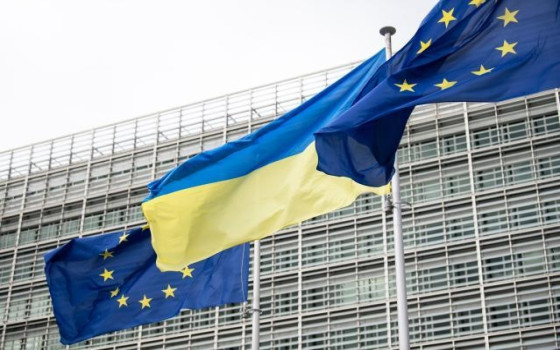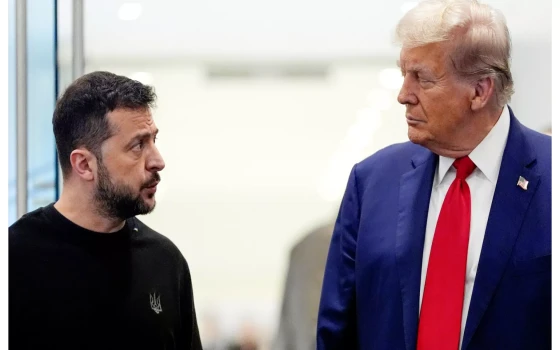US and European sanctions target Russia's oil industry, and "confusion" over the fate of the Trump-Putin meeting... Today's Brussels summit focuses on the Ukraine issue.

- Europe and Arabs
- Thursday , 23 October 2025 11:7 AM GMT
Brussels: Europe and the Arabs
Coinciding with the start of the Brussels summit on Thursday, which brings together European Union leaders and includes support for Ukraine as one of the main issues on the table for discussion, US Secretary of State Marco Rubio stated that his country remains interested in meeting and engaging with Russia, despite President Donald Trump's imposition of sanctions on Rosneft and Lukoil, two of Russia's largest oil companies.
"We still want to meet with the Russians. We will always be interested in dialogue if there is a possibility of achieving peace," Rubio told reporters, according to a report by the European news network in Brussels, Euronews.
For his part, Hungarian Foreign Minister Péter Szijjártó said he had "bad news for the pro-war lobby and good news for those seeking peace. After my meeting with Secretary of State Marco Rubio, it became clear that the United States has not abandoned the Budapest peace summit. Preparations are still underway, and the only question is timing, not intent."
Conflict over the Meeting
The US sanctions decision, according to a statement issued by the Treasury Department, came as a pressure mechanism on the Kremlin due to "Putin's lack of a serious commitment to a peace process that ends the war in Ukraine." This came after Russian overnight attacks that killed seven people, including two children, and the cancellation of a meeting scheduled for next week between President Donald Trump and his Russian counterpart, Vladimir Putin, in Hungary.
Despite Washington's talk of canceling the meeting between the two leaders, the Russian Foreign Ministry confirmed that preparations for the summit are still ongoing, and that Putin's team is working on the details of "the timeline, formats, and sequence of steps," according to Deputy Minister Sergei Ryabkov, who accused "adversaries" of trying to undermine the chances of holding the summit.
Importance of the Sanctions
The sanctions imposed on the two companies would sever their ties to the US banking system and financial institutions, effectively prohibiting them from dealing in US dollars, under penalty of prosecution and severe fines in the event of violation.
For his part, Trump said in the Oval Office during his meeting with NATO Secretary General Mark Rutte, who had made an urgent visit to the White House to support Ukraine: "We canceled the meeting with President Putin. I didn't feel it was appropriate."
He added, "I didn't feel we were going to achieve the desired goal. So I canceled it, but we will do that in the future." He continued, "These are massive, very massive sanctions... They target their two largest oil companies, and we hope they won't last long. We hope the war will be resolved soon."
EU Adopts New Sanctions Package
The European Union has adopted a new package of sanctions targeting Russia's energy infrastructure.
According to Denmark, which holds the rotating EU presidency, the new measures include a ban on imports of Russian liquefied natural gas starting in 2027. The EU will also tighten restrictions on transactions with two major Russian oil companies and add 117 additional vessels from the so-called "shadow fleet" Moscow uses to circumvent previous sanctions.
This package, the nineteenth, represents a new step in the economic escalation against Russia.
The Difference Between Previous and Current Sanctions
According to Michael Carpenter, former advisor to President Joe Biden on European and Russian affairs, these sanctions are a significant step because they are the first such measures taken under Trump, and they target the Russian economy's most vulnerable point: oil revenues.
The expert explained that the Obama administration had previously targeted Russian exploration operations in the Arctic, deepwater, and unconventional areas, but the significance of the current move lies in the fact that the Trump administration has imposed comprehensive sanctions on the same companies this time.
Russia Escalates on the Ground
On the other hand, Ukraine and its allies praised the sanctions, with Latvian Foreign Minister Paipa Prysić saying they are "relatively significant. Both companies are pivotal to the Russian oil sector, and the step itself is significant, especially given the clear coordination with European allies."
A day earlier, Russia launched more than 400 drones and 28 missiles targeting several cities, including Kyiv, Zaporizhia, and Odessa, causing widespread power outages as cold weather set in and temperatures plummeted. Border towns such as Chernihiv in the north and Sumy in the east were the hardest hit. Meanwhile, the Kremlin announced that Putin had led strategic nuclear exercises that included the launch of ballistic missiles.
Tensions Resurface Between Putin and Trump
In this context, Russian analyst Vladimir Pastukhov believed that Putin was able to convince Trump to "put the cart before the horse" when he backed away from pushing for a ceasefire. Meanwhile, pro-Kremlin journalist Mikhail Rostovsky wrote in the Moskovsky Komsomolets newspaper that "Moscow sees no reason to accept a simple ceasefire," arguing that Trump's call for a halt to fighting "doesn't suit Putin," who needs time "to push Zelensky further into a corner." He added that Russia "does not intend to make any unilateral concessions," contradicting Trump's desire to quickly end the war "by any means" to achieve his Nobel Peace Prize ambition.
European Summit in Brussels
European Union leaders began discussions in Brussels on Thursday to approve a new package of support measures for war-torn Ukraine.
Other pressing issues on the agenda for the 27-nation bloc's leaders include European defense, climate change challenges, and strengthening competitiveness.
Ukrainian President Volodymyr Zelenskyy joined the talks to provide an update on Kyiv's most urgent needs in its war against Russia.
Leaders are expected to task the European Commission with preparing a proposal to allow the use of frozen Russian Central Bank assets in the EU for Ukraine. Through this move, the EU could provide Kyiv with up to €140 billion ($162 billion) to finance its military needs and other financial obligations.
Leaders are also seeking to unanimously approve the 19th package of sanctions against Moscow, which includes a ban on imports of liquefied natural gas from Russia, after Slovakia expressed its willingness to drop its initial opposition.
Other topics on the agenda include defense, after the Commission last week proposed four rearmament projects in the areas of border protection, anti-drone defense, air defense, and space, aimed at strengthening European military capabilities and deterring Russia.
Leaders are also expected to discuss the still-undecided target for reducing emissions by 2040 and the economic repercussions of combating climate change, given the EU's difficulty in reaching agreement on new commitments.
The meeting will also address recent developments in the Middle East and the ceasefire between Hamas and Israel, as well as the issue of migration to the EU and the affordable housing crisis.














No Comments Found